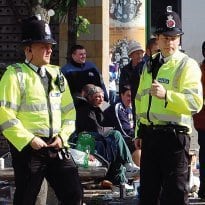Police should be given greater access to medical records without patient consent, a senior police chief has argued in an interview in which he also called for a register of vulnerable people to be set up to facilitate this.
Sir Peter Fahy, the Greater Manchester chief constable, told the Guardian that Alzheimer’s patients and victims of domestic abuse are among those who could benefit from changes to how police can access their data.
He said people with dementia and Alzheimer’s, those with drug or alcohol problems, and those with mental health issues, now make up around 70% of police work.
"We could do a better job if we have greater access to information, which it is currently hard for us to get," he told the Guardian.
"It would give us a deeper understanding of those we are expected to help and their problems. The actions we take would be much improved if we had a better understanding of that history at the time we are called."
Fahy told the Guardian that police are becoming the “service of last resort” for society and could become overwhelmed by increasing demands, while privacy concerns that deny or delay access to information cost them both money and time.
He said too many officers do not have enough information when they respond to an emergency call, with excessive delays in getting the information when it is available. "We need to get it in 20 minutes at 3am."
He believes a national register of vulnerable people should be established, with police and social services able to have greater access to their private data in an emergency.
While some people could choose to opt in to the register, he told the Guardian others could have information shared without their consent to protect them from being harmed.
Fahy said allowing police to access information such as next of kin for people with Alzheimer’s or dementia will help them to contact relatives and find out their medical history, who their GP is, and details of their condition.
He gave another example of a woman suffering from domestic violence, where medical professionals know or think there is something wrong but do not tell the police or other agencies.
He told the Guardian that medical professionals should be able to breach confidentiality and share information to stop further harm, on the understanding that police will not “put the door in and arrest” and instead work with other agencies to solve the problem.
He understood that many people did not trust the state, but said increased information sharing is “crucial” to the success of the public service if properly overseen and regulated.
Dr Tony Calland, chairman of the British Medical Association’s medical ethics committee, said in a statement that police have not made a sufficient case for what would be a “substantial change” to the law.
"The essential principle that runs throughout the recording of medical information is that of confidentiality and trust. This principle has stood the test of time for millennia and still holds good today.
“At present the checks and balances in the current legal position are satisfactory and whilst the current law may cause some difficulty for the police the case has not been made to recommend a substantial change in the law."?

